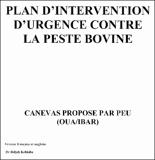PLAN D_INTERVENTION D_URGENCE CONTRE LA PESTE BOVINE

(en=English; ar=Arabic; fr=French; pt=Portuguese)
Type
ReportItem Usage Stats
195
views
views
37
downloads
downloads
Abstract
The OIE International animal health code includes rinderpest in List A diseases, which are
defined as "communicable diseases which have the potential for serious and rapid spread,
irrespective of national borders, which are of serous socio-economic and major importance
in the international trade of animal and animal products.
The time of mass vaccination for the control of rinderpesr has passed for most countries in
Africa (primarily in North, Southern, Western and Central Africa) which is now entering the
final phase of eradication. The threat of re-introduction of rinderpest is best met by a
strategy which relies on early warning of disease occurrence, through rapid recognition and
thorough investigation of suspicious disease events, and ensured early reaction system for
rapid containment and elimination of disease.
The regional dimension is another important element of preparing for an event reintroduction
of rinderpest since all outbreaks of rinderpest must come from somewhere and,
usually, this will be from a neighbouring country, usually a neighbour, in the region. Those
countries with a perceived common status and risk can benefit from developing coordinated
and mutually supportive rinderpest emergency plans which would facilitate the development
of sound strategies by pooling intellectual resources and reducing the cost of, for example,
maintaining vaccine and equipment banks, and diagnostic facilities.
This document was prepared to assist countries to enhance their emergency preparedness
through establishing their own National Rinderpest Emergency Plans.
Collections
- PACE Documents & Reports [158]